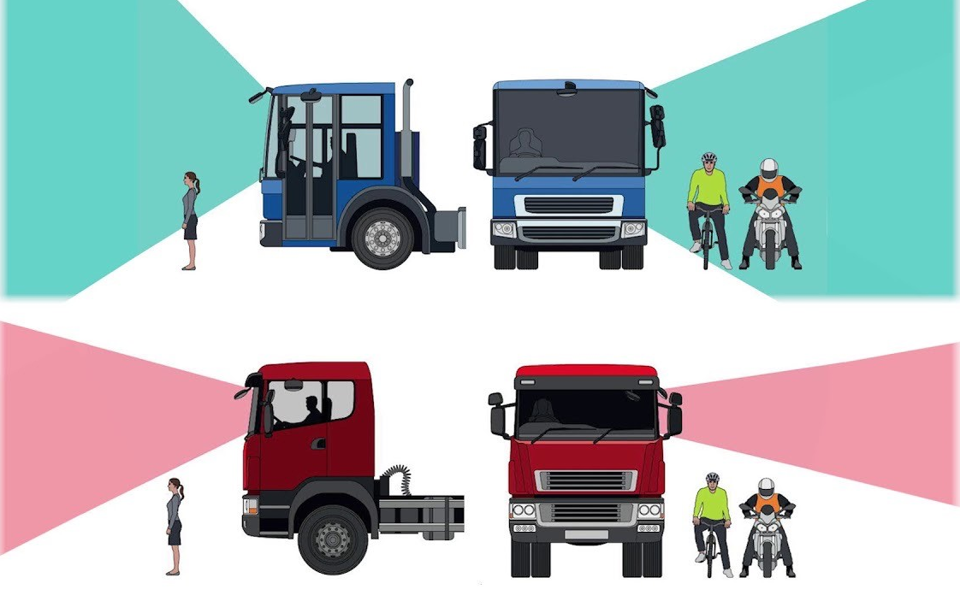HGVs over 12 tonnes will be required to have a three-star rating or fit vehicles with a range of safety systems to operate in Greater London from October 2024, Transport for London (TfL) has announced.
A decision made by London Councils Transport and Environment Committee yesterday (Monday, June 12), has paved the way for changes to the capital’s Direct Vision Standard (DVS) based HGV safety permit scheme.
Under previously agreed arrangements, from October 28, 2024, HGVs over 12 tonnes will be required to have a minimum three-star DVS rating or fit a system of updated safety features - the Progressive Safe System (PSS) - in order to operate in Greater London.
TfL says that there will be a three-month grace period from the start date for operators to comply with the new requirements.
This will be kept under review and London Councils committee says it will consider whether any further extension is needed in June 2024.
Mayor Philip Glanville, London Councils’ executive lead for climate change, transport and environment, said: “After a robust discussion at London Councils Transport and Environment Committee, we have agreed an implementation plan for the Progressive Save System with further debate planned for next year.
“We will continue to work diligently with TfL and the haulage industry to ensure the safety of London’s road-users is paramount.
“London boroughs are committed to Vision Zero and understanding how we can make London’s roads safer for our communities.
“We can and must do more to reduce road danger until there are no deaths on the capital’s roads.”
London's HGV safety permit scheme, first introduced in 2019, requires all operators of HGVs weighing more than 12 tonnes to apply for a free safety permit to operate in London, regardless of its DVS star rating.
An HGV’s DVS star rating is based on how much the driver can see directly through the vehicle’s cab windows of the area around the vehicle where collisions are most likely to take place.
Data shows that fatal collisions where vision is a contributing factor have reduced by half between 2018 and 2021 (down from 12 to 6).
Provisional data also shows that fatal collisions where vision is a contributing factor have also continued to fall from 2021 to 2023 (down from 6 to 3).
This, says TfL, shows the importance of the HGV safety permit scheme in reducing road danger in London and achieving the Mayor's Vision Zero goal of eliminating death and serious injury from London’s transport network.
Since its introduction, 253,745 safety permits have been issued, including nearly 6,000 five-star vehicles, which provide the highest levels of direct vision.
More than 151,000 zero-star HGVs have now had safe systems fitted.
The scheme’s average daily compliance is also very high, with more than 94% of HGVs in London now operating with a safety permit, and hauliers are reporting that they are building DVS requirements into future purchasing decisions.
The current system of additional safety measures was originally developed and consulted on in 2018, and has been reviewed by TfL, reflecting new equipment and technologies available on the market since then. This new updated system will be known as the Progressive Safe System.
TfL consulted on the new DVS proposals earlier this year. It showed support (55%) for the principles of DVS, the HGV safety permit scheme and the principles underpinning the Progressive Safe System.
Changes include:
- Updating existing guidance on the use of mirrors and mirror-replacement Camera Monitoring Systems (CMS)
- The requirement for CMS fitted on vehicles to eliminate any remaining blind spots on the passenger side
- Moving Off Information Systems (MOIS) fitted to the front of a vehicle to prevent collisions at the frontal blind spot zone when a vehicle moves off from rest
- Audio warnings fitted to all vehicles, including those with left hand drive to ensure all vehicles operating in London have the ability to warn of an intended manoeuvre
Following the consultation, TfL says it has decided to modify the proposal to mandate sensors to the trailers of articulated vehicles into a recommendation only.
TfL will work with the industry to monitor the level of readiness to fit PSS measures ahead of the October 2024 launch and assess, in consultation with London Councils, in June 2024 whether an extension to the three-month grace period is needed.
To be eligible, operators of existing zero and all one and two star rated vehicles need to register their eligible vehicle(s) with TfL having supplied satisfactory evidence showing they have an appointment with fitters to install the PSS equipment before January 31, 2025.
This arrangement, it added, would not apply to operators applying for new vehicle Safety Permits after October 28, 2024, when the new scheme starts.
Alongside these changes, a number of user experience improvements, including a tool for operators to check vehicles’ permits, will be made available to optimise the HGV safety permit application process, TfL said.
Christina Calderato, TfL's director of transport strategy and policy, added: “We're determined to make roads safer for everyone and are committed to Vision Zero, the Mayor's goal to eliminate death and serious injury from the transport network.
“It’s vital that all vehicles using London’s roads have safety at the forefront of their design and our world-first Direct Vision Standard has helped to significantly improve lorry safety, reducing fatal collisions where vision is a contributing factor by three quarters between 2018 and 2023.
“We will continue to take every possible measure to eradicate deaths and serious injuries from our roads and enhancing the safe systems for HGVs will help us do so.”
























Login to comment
Comments
No comments have been made yet.